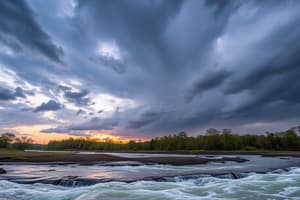Podcast
Questions and Answers
Which processes are studied in hydrometeorology? (Select all that apply)
Which processes are studied in hydrometeorology? (Select all that apply)
- Nuclear fusion
- Evaporation (correct)
- Condensation (correct)
- Surface runoff (correct)
Tropical cyclones always form over oceans where sea surface temperatures are below 26°C.
Tropical cyclones always form over oceans where sea surface temperatures are below 26°C.
False (B)
What are some examples of hydrometeorological hazards? (Select all that apply)
What are some examples of hydrometeorological hazards? (Select all that apply)
- Drought (correct)
- Tropical cyclones (correct)
- Floods (correct)
- Earthquakes
What is hydrometeorology?
What is hydrometeorology?
What is the primary formation condition for tropical cyclones?
What is the primary formation condition for tropical cyclones?
Tropical cyclones are also known as ______ in the Western North Pacific.
Tropical cyclones are also known as ______ in the Western North Pacific.
Why is the Philippines particularly vulnerable to tropical cyclones?
Why is the Philippines particularly vulnerable to tropical cyclones?
Flashcards are hidden until you start studying
Study Notes
Hydrometeorology
- Studies the water cycle, which includes the processes that occur within the atmosphere (evaporation, condensation, precipitation) and on the ground (rainfall interception, infiltration, surface runoff).
- Focuses on the interactions between atmospheric and ground-based processes related to the water cycle.
- Examines the behavior of various hydrological elements such as rivers, ponds, and dams.
- Acknowledges the significant impact of oceans and seas on continental weather patterns.
Water Cycle
- A significant portion of solar energy absorbed by the sea surface is used for evaporation.
- Evaporated water rises into the atmosphere and condenses, leading to cloud formation and various forms of precipitation.
- Intense cyclonic circulations, also known as tropical cyclones, can form due to these processes.
Hydrometeorological Hazards
- These hazards include atmospheric, hydrological, or oceanographic events that can cause loss of life, injuries, property damage, social and economic disruption, or environmental degradation.
- Examples include:
- Tropical cyclones
- Monsoon rains (like habagat and amihan)
- Tornadoes
- Ipo-ipo
- Thunderstorms
- Floods
- Drought
- Wildfires
Tropical Cyclones
- Warm-core low-pressure systems with inward spiraling mass at the bottom level and outward spiraling mass at the top.
- Require ocean temperatures above 26°C for formation.
- Cannot form over the South Atlantic Ocean and the South Eastern Pacific due to cooler sea surface temperatures and stronger vertical wind shear.
- Designated by different names depending on their location:
- Typhoons in the Western North Pacific (around the Philippines, Japan, and China).
- Hurricanes in the North Atlantic, North-Eastern Pacific, and Central Pacific.
- Typhoons in the Northwest Pacific Ocean.
- The Philippines is particularly vulnerable due to its geographical location.
Studying That Suits You
Use AI to generate personalized quizzes and flashcards to suit your learning preferences.




